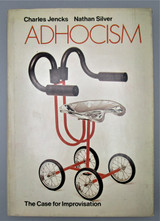Remembering Charles Jencks: Prolific Postmodernist

Prolific Postmodern Architect, Charles Jencks, was a cultural theorist, world renown landform architect and architectural historian. He passed on Oct. 13, 2019 at the age of 80.
A recent bio said this about him: "As the unrivaled godfather of postmodernism, Jencks wrote, spoke and enthused in his characteristically charming, witty and debonair manner, for 50 years about architecture that embraced pluralism and difference over standardised homogeneity... His key book, Modern Movements in Architecture, published in 1973 and largely based on his PhD thesis, argued that modernism was a much more diverse affair than previous histories had claimed. [Guardian] This dynamic and prolific man contributed extensively to architecture, culture and society.
Jencks also had a talent for bringing architects and others together for the greater good. When his wife Maggie passed from cancer, he turned his focus to developing the program they conceived when she was first diagnosed. He co-founded Maggie's Cancer Caring Centres to address the care, needs and struggles that accompany protracted illness. "The centres provide social and psychological help in an attractive setting next to large hospitals. Their architecture, landscape, and art are designed to support both patients and caregivers and to give dignity to those who, in the past, often hid their disease." [Wikipedia]
One of Jencks earliest writings was Adhocism: The Case For Improvisation, written with Nathan Silver and first published in 1972. Considered a designers' cult classic, this counterculture manifesto encourages one to step outside the lines of tradition. Instead of following set guidelines, Jencks and Silver encourage people to let function steer the design, to consider how the space will be used and then to use what materials and space are readily available. Forty years later, these ideas are still garnering enough attention to warrant a reprint in 2013 with additional writings from both authors.
Some notable quotes from Jencks:
"The rule seems to be that there are no absolutes, that what is rare is prized. Thus, in times of relative affluence, thin models become dominant."
"The singular point of beautiful objects, and people, is that they are experienced not as parts, or ratios between cheekbones and chin, but as wholes. The experience of beauty is a perception, but it is one that mixes up various other sensations and makes them converge in a particular way."
